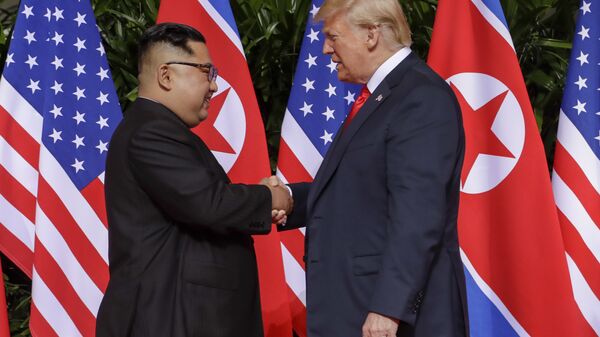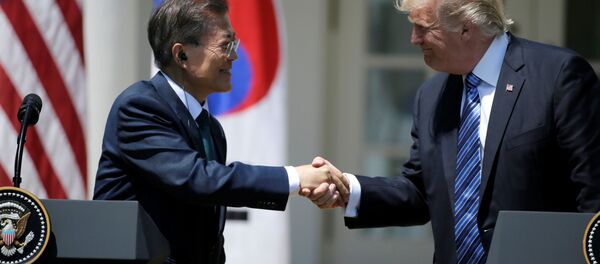North Korean leader Kim Jong-un "supervised and guided a test-fire of a new-type tactical guided weapon conducted by the Academy of Defense Science on Wednesday," the official Korean Central News Agency (KCNA) reported.
READ MORE: North Korea Demands Pompeo's Removal From Nuclear Talks With US
Without specifying the new weapon’s capabilities, the KCNA said the design indexes of the tactical guided weapon were "perfectly verified" during the test.
North Korea’s weapon test on Wednesday came as further peace talks looked to be stalled, after Kim Jong-un and US President Donald Trump were unable to bridge their gaps and produce a detailed agreement on denuclearization during their meeting in Hanoi, Vietnam.
Provocation for Progress
Political analysts suggested that Pyongyang’s decision to conduct the weapon test fit North Korea’s strategy of leveraging such provocative actions to remind the United States the importance of peace talks.
"I believe this is a provocative signal North Korea is sending to push forward the peace talks. Last November, when the peace talks stalled, North Korea conducted a similar tactical weapon test. Similar to the test this week, they also didn’t reveal details of the tested weapon. The ultimate goal is to show the United States that North Korea would not offer more concessions under US pressure and convince US negotiators that a pragmatic and flexible approach can help push the peace talks forward," Zhao Tong, a fellow in Carnegie’s Nuclear Policy Program at the Carnegie–Tsinghua Center for Global Policy in Beijing, told Sputnik.
The expert noted that North Korea carefully calculated to only test a tactical weapon without revealing more details, to avoid overly provoking the United States and convince Trump to remain interested in the peace talks.
READ MORE: North Korea Vows to Continue Military Buildup to Repel Possible Invasion
Other North Korea watchers pointed out that the tactical weapon Pyongyang tested would not pose a direct threat to the United States.
"The weapon North Korea tested was a tactical weapon, not a strategic (nuclear) weapon. It’s not the kind of long-range missile that would threat the United States. While demonstrating its firm position, North Korea also wanted show the United States that the weapons it is developing would not be a direct threat to US national security. This fits Pyongyang’s ultimate goal of making the United States accept it as a nuclear state," Zhang Liangui, an expert on North Korea at the Central Party School, which trains Chinese officials in Beijing, told Sputnik.
Breaking Point
Explaining why he failed to reach a deal on denuclearization with Kim after their meeting in Vietnam, Trump stressed that North Korea wanted the United States to lift all the economic sanctions while being unwilling to give up all of its nuclear facilities.
"Basically, they wanted the sanctions lifted in their entirety, and we couldn’t do that. They were willing to denuke a large portion of the areas that we wanted, but we couldn’t give up all of the sanctions for that," Trump said during the press conference following the summit in Vietnam.
Pyongyang’s focus on lifting economic sanctions demonstrated that such punitive measures indeed have an impact on the stability of the regime in North Korea, Zhao from the Carnegie–Tsinghua Center for Global Policy explained.
"It’s a matter of time. If the comprehensive economic sanctions continue, the strategic reserves of North Korea could be depleted sooner or later. That would have a huge impact on the nation’s economic stability. It could even threat North Korea’s social stability or the rule of the current regime. But when this time will come, it’s very difficult to say. We don’t know if North Korea can hold on for 3-5 years, or they could reach the breaking point in a few months," he said.
Amid stalled negotiations with the United States, North Korea started to turn to China and Russia for possible economic assistance, Zhang from the Central Party School noted.
"The economic sanctions have been a serious blow to North Korea’s foreign currency income. Whether North Korea can hold on under such economic pressure, it would depend on China and Russia. If both China and Russia continue to enforce the United Nations resolutions strictly without extending additional assistance to Pyongyang, the regime may not be able to hold on much longer. It’s obvious that North Korea has started to try to generate more foreign currency income from China through tourism. Kim Jong-un’s expected visit to Russia in the near future would carry a similar purpose," he said.
Kim Jong-un is expected to visit Russia in late April and hold his first meeting with Russian president Vladimir Putin, the Kremlin confirmed in a statement on Thursday.
The expert believes it is up to China and Russia to decide whether they want to continue to keep up the pressure on North Korea to convince Kim Jong-un that complete denuclearization is the only option for him.
Undisclosed Nuclear Facilities
During the press conference in Vietnam, Trump revealed that the United States had knowledge of North Korea’s nuclear facilities that had not been disclosed by Pyongyang.
READ MORE: Kim Re-Elected As State Affairs Commission Chair, N Korea Constitution Reviewed
"We had to have more than that (dismantling the Yongbyon nuclear complex), yeah. We had to have more than that because there are other things that you haven’t talked about, that you haven’t written about, that we found… And we brought many, many points up that I think they were surprised that we knew. But we had to do more than just the one level. Because if we did the one level, and we gave up all of that leverage that’s been taking a long time to build," Trump said.
If North Korea agrees to freeze activities at all the nuclear facilities the United States listed, it could win US concessions on sanction reliefs while holding onto its existing nuclear arsenal, Zhao from the Carnegie–Tsinghua Center for Global Policy suggested.
"I believe there is still room for concessions from both sides. If North Korea commits to a complete freeze of activities at its nuclear facilities, which was more than the Yongbyon nuclear complex it offered during the negotiations in Vietnam, I think it’s acceptable for Pyongyang as it would not hurt its existing nuclear arsenal and deterrence capabilities. If North Korea takes this small step forward and requests the United States to lift the economically sanctions partially, with clauses to reverse the sanctions in case of violations from Pyongyang, Washington could be willing to take this offer," he said.
Zhao explained that North Korea’s offer to dismantle the Yongbyon nuclear complex could not convince the United States to lift economic sanctions, because the income from sanction reliefs could be used to develop nuclear materials at the undisclosed facilities.
The expert suggested neighboring countries such as China and Russia could focus their diplomatic efforts on persuading Pyongyang to include all of its nuclear facilities during peace talks, while pushing Washington to offer sanction reliefs in exchange for a complete freeze of those facilities.
The views and opinions expressed by the contributors do not necessarily reflect those of Sputnik.



